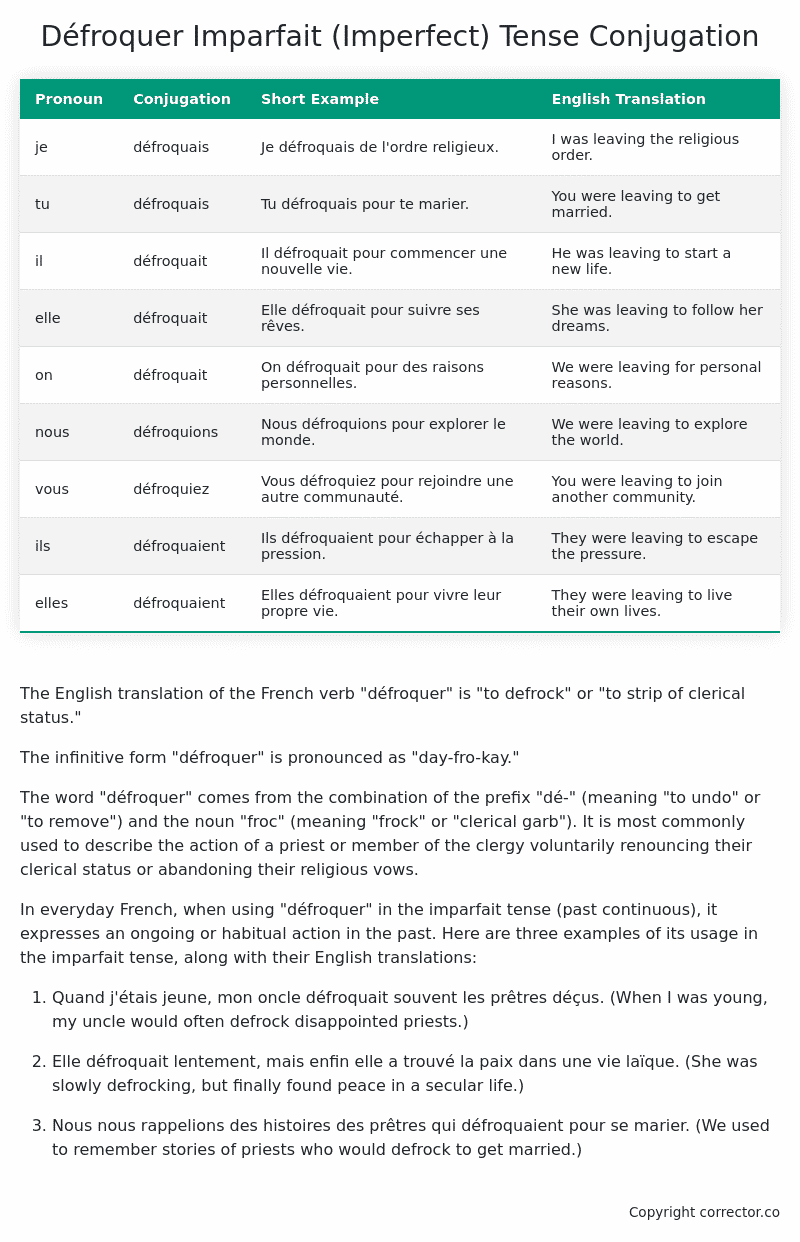Imparfait (Imperfect) Tense Conjugation of the French Verb défroquer
Introduction to the verb défroquer
The English translation of the French verb “défroquer” is “to defrock” or “to strip of clerical status.”
The infinitive form “défroquer” is pronounced as “day-fro-kay.”
The word “défroquer” comes from the combination of the prefix “dé-” (meaning “to undo” or “to remove”) and the noun “froc” (meaning “frock” or “clerical garb”). It is most commonly used to describe the action of a priest or member of the clergy voluntarily renouncing their clerical status or abandoning their religious vows.
In everyday French, when using “défroquer” in the imparfait tense (past continuous), it expresses an ongoing or habitual action in the past. Here are three examples of its usage in the imparfait tense, along with their English translations:
-
Quand j’étais jeune, mon oncle défroquait souvent les prêtres déçus.
(When I was young, my uncle would often defrock disappointed priests.) -
Elle défroquait lentement, mais enfin elle a trouvé la paix dans une vie laïque.
(She was slowly defrocking, but finally found peace in a secular life.) -
Nous nous rappelions des histoires des prêtres qui défroquaient pour se marier.
(We used to remember stories of priests who would defrock to get married.)
Table of the Imparfait (Imperfect) Tense Conjugation of défroquer
| Pronoun | Conjugation | Short Example | English Translation |
|---|---|---|---|
| je | défroquais | Je défroquais de l’ordre religieux. | I was leaving the religious order. |
| tu | défroquais | Tu défroquais pour te marier. | You were leaving to get married. |
| il | défroquait | Il défroquait pour commencer une nouvelle vie. | He was leaving to start a new life. |
| elle | défroquait | Elle défroquait pour suivre ses rêves. | She was leaving to follow her dreams. |
| on | défroquait | On défroquait pour des raisons personnelles. | We were leaving for personal reasons. |
| nous | défroquions | Nous défroquions pour explorer le monde. | We were leaving to explore the world. |
| vous | défroquiez | Vous défroquiez pour rejoindre une autre communauté. | You were leaving to join another community. |
| ils | défroquaient | Ils défroquaient pour échapper à la pression. | They were leaving to escape the pressure. |
| elles | défroquaient | Elles défroquaient pour vivre leur propre vie. | They were leaving to live their own lives. |
Other Conjugations for Défroquer.
Le Present (Present Tense) Conjugation of the French Verb défroquer
Imparfait (Imperfect) Tense Conjugation of the French Verb défroquer (You’re reading it right now!)
Passé Simple (Simple Past) Tense Conjugation of the French Verb défroquer
Passé Composé (Present Perfect) Tense Conjugation of the French Verb défroquer
Futur Simple (Simple Future) Tense Conjugation of the French Verb défroquer
Futur Proche (Near Future) Tense Conjugation of the French Verb défroquer
Plus-que-parfait (Pluperfect) Tense Conjugation of the French Verb défroquer
Passé Antérieur (Past Anterior) Tense Conjugation of the French Verb défroquer
Futur Antérieur (Future Anterior) Tense Conjugation of the French Verb défroquer
Subjonctif Présent (Subjunctive Present) Tense Conjugation of the French Verb défroquer
Subjonctif Passé (Subjunctive Past) Tense Conjugation of the French Verb défroquer
Subjonctif Imparfait (Subjunctive Imperfect) Tense Conjugation of the French Verb défroquer
Subjonctif Plus-que-parfait (Subjunctive Pluperfect) Tense Conjugation of the French Verb défroquer
Conditionnel Présent (Conditional Present) Tense Conjugation of the French Verb défroquer
Conditionnel Passé (Conditional Past) Tense Conjugation of the French Verb défroquer
Conditionnel Passé II (Conditional Past II) Tense Conjugation of the French Verb défroquer
L’impératif Présent (Imperative Present) Tense Conjugation of the French Verb défroquer
L’impératif Passé (Imperative Past) Tense Conjugation of the French Verb défroquer
L’infinitif Présent (Infinitive Present) Tense Conjugation of the French Verb défroquer
L’infinitif Passé (Infinitive Past) Tense Conjugation of the French Verb défroquer
Le Participe Présent (Present Participle) Tense Conjugation of the French Verb défroquer
Le Participe Passé (Past Participle) Tense Conjugation of the French Verb défroquer
Struggling with French verbs or the language in general? Why not use our free French Grammar Checker – no registration required!
Get a FREE Download Study Sheet of this Conjugation 🔥
Simply right click the image below, click “save image” and get your free reference for the défroquer imparfait tense conjugation!

Défroquer – About the French Imparfait Tense
NOTE: To take a deep dive into all the French tenses then see our article on Mastering French Tense Conjugation.
Formation of the Imparfait Tense
For regular -er verbs:
For regular -ir verbs
For regular -re verbs
Common Everyday Usage Patterns
Description of Past Habits
Background Information
Mental and Emotional States
It’s employed to express emotions, thoughts, or physical sensations in the past. For example: “J’étais content quand il est arrivé.” (I was happy when he arrived.)
Ongoing Actions
Points to Note About the Imparfait Tense
Passé Composé vs. Imparfait
Conditional
Si Clauses
Narration
I hope you enjoyed this article on the verb défroquer. Still in a learning mood? Check out another TOTALLY random French verb imparfait conjugation!


